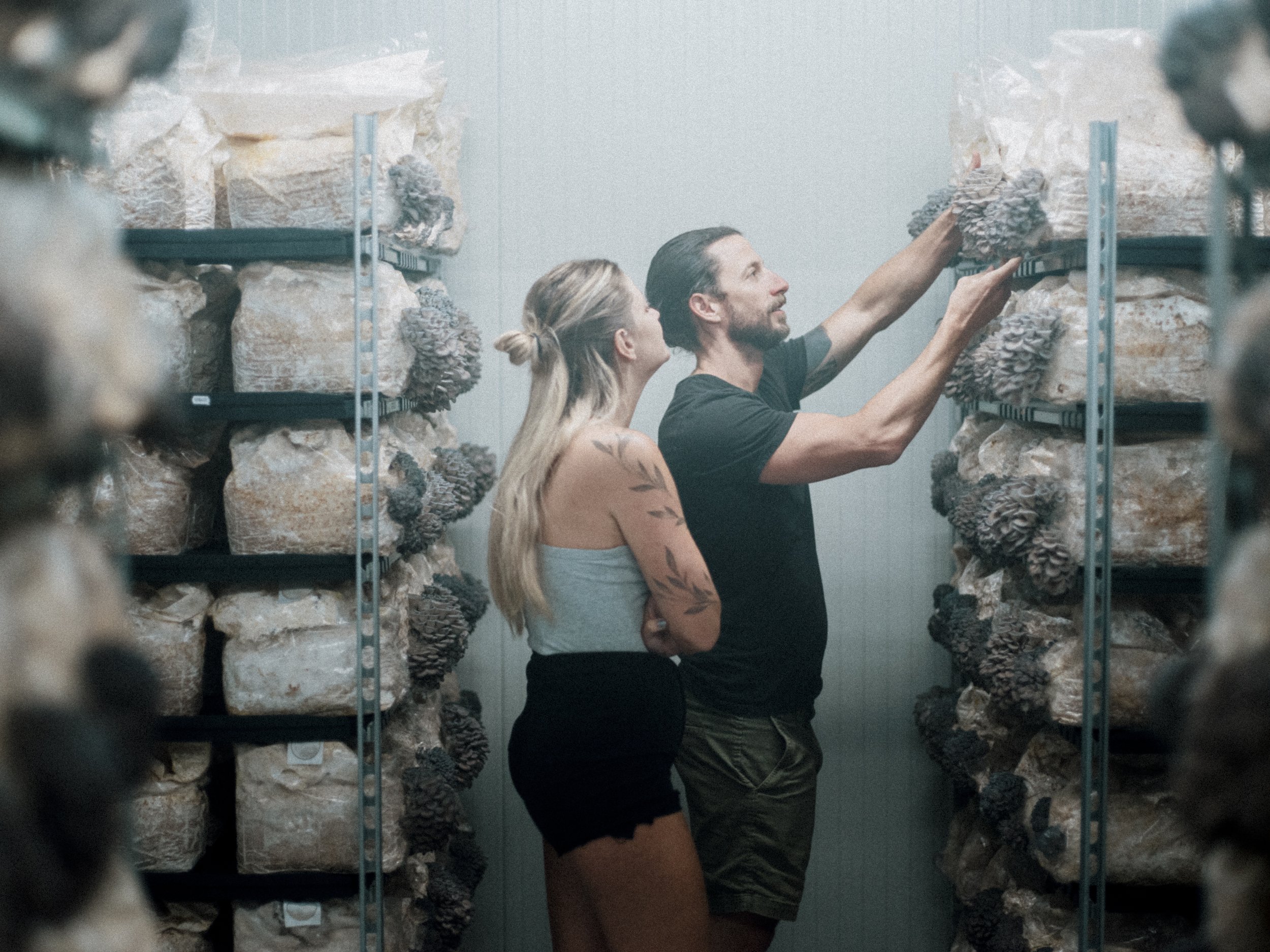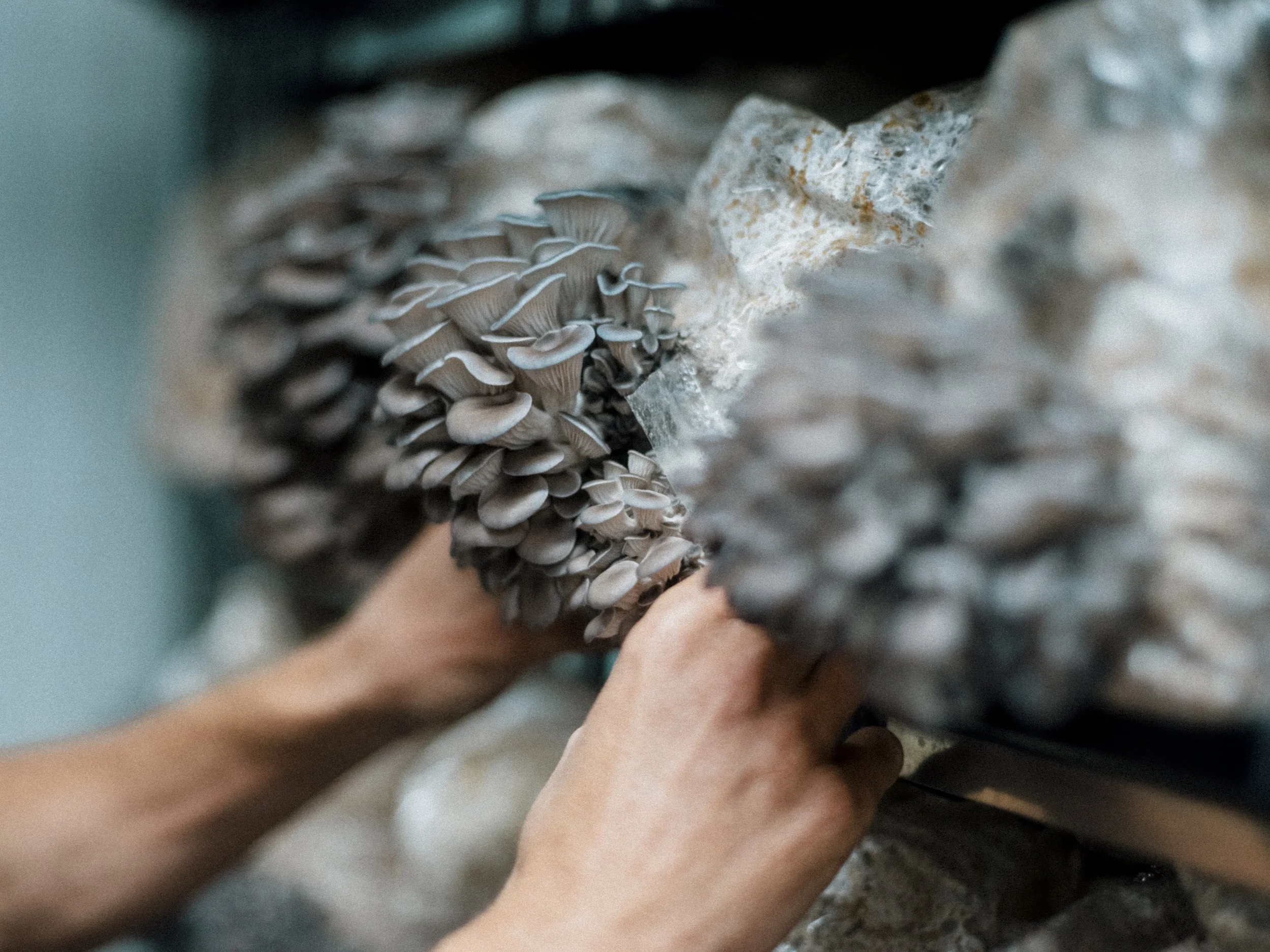The importance of storytelling
ARK
Restaurant Ark is the first-ever vegan restaurant in the Nordics to be awarded a Michelin Green Star. For owner Jason Renwick and his team, strong storytelling, and challenging stereotypes about what vegan food can be form the bedrock of much of their success.
It’s not by coincidence that we meet Jason Renwick, founder of Ark, and his partner Jenia Nelisova, who is also Ark’s creative director, at Funga Farm. That’s the mushroom farm supplying what Jason himself calls “the star of the show” at Ark, and the perfect meat substitute: The mushrooms.
The farm is also an important part of the ARK universe and the story they want to tell:
“When I’m contacted by a journalist, I almost always invite them out to the farm or out foraging first – before they come to the restaurant,” Jason Renwick says. “There’s so much more to what we do than merely the restaurant and the kitchen, and the best way to tell people is to show them.”
There's so much more to what we do than merely the restaurant and kitchen.
“
Funga Farm was originally founded by Kyle Cometta is now co-owned by him, Renwick, and several others. And it is indeed another world compared to the fine-dining restaurant in the heart of Copenhagen: It’s located in the vast industrial sprawl called Priorparken outside of Copenhagen. An area so obscure it’s not even on Google Street View. The farm’s two closest neighbors are a vinyl pressing plant and a massive PostNord distribution hub, and it shares part of its facilities with a circular craft brewery.
Unsurprisingly, it looks nothing like your classic idea of a farm.
Inside, obscure mushroom strains like blue oyster, lion’s mane, cinnamon cap, and the super-rare coral tooth are grown. It’s a process going all the way from making the spores to growing the mushrooms in optimal conditions inside bags stacked on shelves. The growing process itself takes place inside temperature-regulated rooms.
Why we’ve chosen ARK
Few people in the industry are as visibly passionate and adept at storytelling as Jason Renwick and his team. They have managed to defy the common stereotypes about plant-based cuisine, as well as get the story out there and broaden the scope beyond “just” the restaurant itself.
They are also leading the charge in terms of green gastronomy in Copenhagen, with Ark and Bistro Lupa both having earned the Green Michelin Star and Plate.
“The farm already existed when we started ARK, but in a different location. We tried the mushrooms and had an epiphany because of the taste and the texture. It’s also one of the key things that food critics and guests emphasize about their experience at ARK. We were also very inspired by Kyle, and his passion and dedication, and we felt we had to become a part of this,” says Jenia Nelisova.
Last year, Funga Farm moved from a small basement in Copenhagen to its current location. It’s part of a plan to scale production to an increasing demand from restaurants across the city.
Vegan without the stereotypes
The mushrooms symbolize the central philosophy behind ARK: Being plant-based without compromising on taste and quality. And without sounding overly preachy. According to Renwick, having a vegan restaurant does subject you to certain prejudices. And that’s something you have to challenge by simply doing better:
“Vegan food just doesn’t taste very good – even our own first vegan place, Souls, was pretty terrible by today’s standards,” he says. “Most of the original vegan restaurants were run according to a “hippie” worldview, where saving the planet takes absolute priority over making tasty food or having a viable business. We do want to be a part of saving the planet, but we can’t compromise on the other two things.”
Renwick and his team had originally envisioned ARK as a steakhouse (they are not exclusively vegan themselves) before deciding to go all-in on plant-based food. Hitting that “meaty” flavor and texture is essential, which is why they hired Brett Lavender as executive chef. He has experience working in Michelin restaurants and did not come from a vegan approach to cooking.
“
Vegan food just doesn’t taste very good.
“We don’t want any extra leeway from guests or critics simply because we’re plant-based. The food should be judged on its own merits. We see ourselves much more in competition with other farm-to-table fine dining restaurants than with plant-based restaurants,” says Jenia Nelisova.
Although ARK was awarded a Michelin Green Star in 2021, they make it clear that they’ve set their sights on a regular star as the next milestone of recognition. Just recently, Bistro Lupa, ARK’s more casual cousin and part of the wider ARK universe, was also awarded a green star.
A bigger story to tell
It’s evident that ARK and the rest of the concepts and restaurants under that umbrella are all part of a bigger story. And it’s one that Renwick and the team are eager to share with guests and media:
“It might sound lofty, but I do believe that you are making a positive impact if you eat at ARK or support businesses like ours. But we prefer to show rather than tell, and we don’t want to force anything down people’s throats.” he explains.
The story of the mushrooms is also bigger than at first glance: They are much more than a tasty meat surrogate. Mushrooms like those grown at Funga Farm require almost a thousand times less water than beef production, release considerably less CO2, and have unique abilities to restore damaged ecosystems.
In the longer term, the ambition is to go fully circular in the production by using residual products from the neighboring brewery to feed the mushrooms.
When engaging with media and journalists, Renwick often goes above and beyond to make himself available, and ensure they get the best possible story.
He even offers to pick them up by car, so the journey to the farm or nearby forests doesn’t become an obstacle. He is convinced that the extra time invested in getting the story out will pay dividends down the road.
“The biggest challenge for us right now is the price point relative to what consumers are willing to pay. I believe that’s a general issue for restaurants, but it is especially true when you’re plant-based,” he says.
“When you look at the amount of work we put in, the prices we can currently charge are just not proportionate. Part of changing that means telling a compelling enough story, and broadening the scope to what’s going on outside of the kitchen and the restaurant.”
Jason Renwick and Jenia Nelisova’s tips:
We asked all interviewees for their best advice based on their own experiences in the industry. Here are Jason and Jenia’s tips for you, if you’re a restaurateur, chef or entrepreneur within the restaurant business:
-
In terms of good storytelling, being as transparent as possible – even when it comes to your shortcomings and limitations – is very important. It’s an ideal we try to live up to ourselves, rather than glossing over something or leaving out an inconvenient detail. It’s true for all types of restaurants, but it is especially true when you are concerned with the climate and sustainability, where there are ample pitfalls and risks of being accused of greenwashing.
-
This is something that gets said too rarely in this industry. Looking back at when we got started, we would most likely have tried to take things slower, even if that would mean scaling back or not getting things done as fast.













